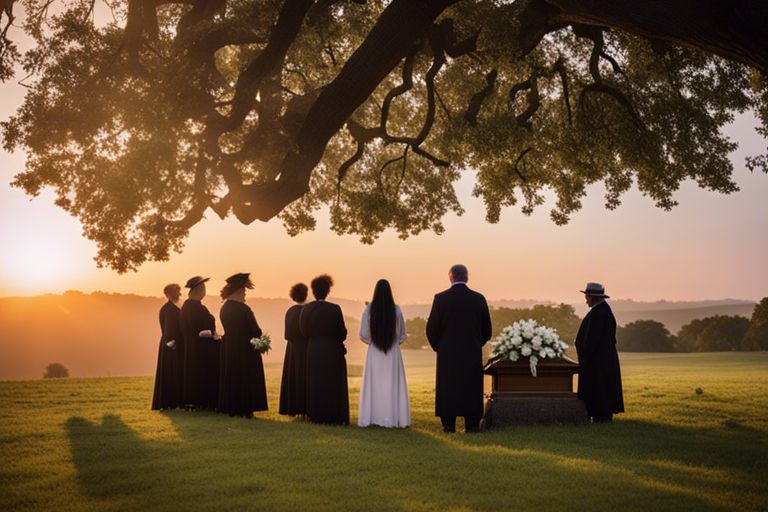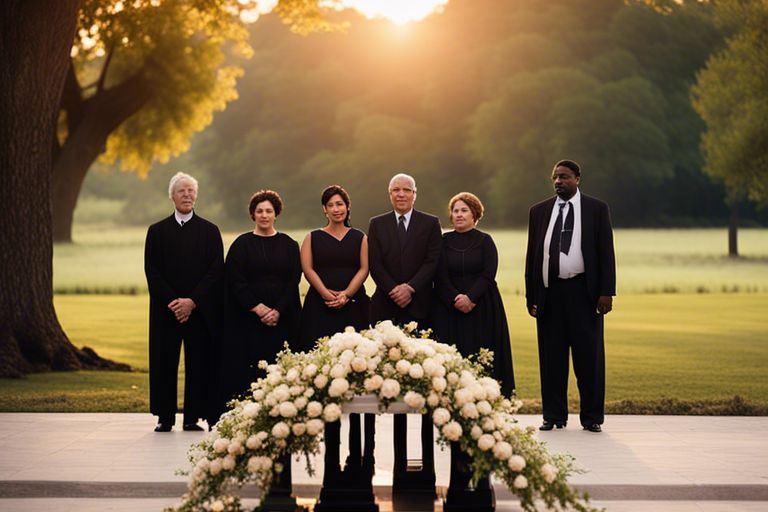As an experienced funeral director, I frequently encounter questions about funeral timing. After a death occurs, there are various factors that can impact when the funeral will take place. Understanding these factors can help you and your loved ones make informed decisions during a difficult time. In this blog post, I will discuss the typical timeline for planning a funeral, as well as the importance of taking time to grieve before making arrangements. I will also address factors that can cause delays in funeral timing, and provide tips for ensuring that the funeral takes place in a timely manner. By the end of this post, you will have a better understanding of funeral timing and be better equipped to make informed decisions when the time comes.
Key Takeaways:
- Funeral timing varies. There is no one-size-fits-all timeframe for holding a funeral after a death. It can depend on cultural, religious, and personal preferences.
- Consult with family and religious leaders. It’s important to involve close family members and religious leaders in decision-making about funeral timing to ensure the wishes of the deceased are respected.
- Consider practical factors. Logistics such as accommodating out-of-town guests, arranging for the deceased’s repose, and coordinating with a chosen venue can affect the timing of the funeral.
- Allow time for grieving. While some prefer to hold the funeral soon after a death, others may need more time to process their grief before the event. It’s important to consider the emotional needs of loved ones.
- Be flexible and respectful. Ultimately, the timing of a funeral should be approached with flexibility and respect for the wishes and needs of the deceased and their loved ones.
Factors Affecting Funeral Timing
A number of factors influence the timing of a funeral. It’s important to consider these factors when planning a service for your loved one. Here are some of the factors that may affect funeral timing:
- Cultural and religious considerations
- Legal requirements
- Family preferences
Though these factors can vary depending on the situation, they play a crucial role in determining when the funeral will take place.
Cultural and Religious Considerations
Cultural and religious beliefs are key factors in determining the timing of a funeral. Different cultures and religions have specific customs and traditions that dictate the timeline for holding a funeral service. For example, in some cultures, the funeral may take place within 24 to 48 hours of the death, while in others, it may be delayed to allow for extended mourning periods or to accommodate religious ceremonies or practices. It’s essential to consider these considerations when planning the funeral to ensure that the service respects and honors the deceased’s cultural and religious beliefs.
Legal Requirements
Legal requirements also play a significant role in determining the timing of a funeral. Some jurisdictions have specific laws and regulations governing the timing of funerals, including requirements for embalming, waiting periods before cremation, or permits for burial. It’s important to familiarize yourself with the legal requirements in your area to ensure that the funeral proceeds in compliance with the law.
Family Preferences
Family preferences can also influence the timing of a funeral. Personal schedules, travel arrangements, and the need to coordinate with extended family members and friends may all play a role in determining when the funeral will take place. It’s essential to consider the wishes and needs of the family when deciding on the timing of the funeral, as this can help ensure that the service accommodates the availability and preferences of those closest to the deceased.

Practical Considerations for Funeral Timing
Assuming you have already made the decision to hold a funeral for your loved one, there are several practical considerations to take into account when determining the timing of the service. One important aspect to consider is the funeral service arrangement, which can have a significant impact on the overall timing of the funeral. You can find more information about funeral service arrangement and timing here.
Logistics of Planning a Funeral
When it comes to planning a funeral, there are numerous logistical factors to consider. This can include coordinating with family members and friends, choosing a venue, arranging for transportation, and deciding on the order of events during the service. It is important to consider all of these aspects carefully to ensure that the funeral runs smoothly and honors the memory of your loved one in the best possible way.
Availability of Funeral Services
Another crucial factor to take into consideration is the availability of funeral services. Depending on the time of year and location, funeral homes and venues may be booked well in advance. It is important to reach out to potential service providers as soon as possible to secure a date and time that works for both you and the venue. Additionally, you may need to consider the availability of clergy or other individuals who will be leading the service.
Coping with Delayed Funerals
Not all funerals happen immediately after a loved one passes away. Sometimes, due to various circumstances, the funeral may be delayed by days, weeks, or even longer. Handling such a prolonged grieving process can be challenging, but it is important to know that it is okay to feel the emotions you are feeling. It is normal to experience a mix of sadness, frustration, and even anger when faced with a delayed funeral. During this time, it is crucial to be gentle with yourself and to seek support from friends, family, or professionals if needed.
Emotional Impacts of Delayed Funerals
Experiencing a delayed funeral can prolong the grieving process and amplify the emotional impact of losing a loved one. It may feel like closure is being postponed, leading to increased feelings of sadness and a sense of being unable to move forward. Additionally, the anticipation of the funeral can also create a sense of anxiety and uncertainty. It is important to acknowledge these emotions and allow yourself to feel them. Talking to a trusted confidant, engaging in self-care activities, and seeking professional help are all valid ways to cope with the emotional impact of a delayed funeral.
Support and Resources for Families
During the time leading up to a delayed funeral, families may benefit from accessing support and resources to help them cope with their emotions. Connecting with a grief support group or counselor can provide a safe space to process feelings and gain insights into navigating the grieving process. Additionally, families may find solace in engaging in meaningful rituals or commemorations to honor their loved one while they await the funeral. Seeking practical help with funeral arrangements and logistical considerations can also ease the burden on the family during this difficult time.
FAQ: How Long After a Death Is the Funeral? Understanding Funeral Timing
Q: What factors impact the timing of a funeral after a death?
A: The timing of a funeral can be influenced by cultural, religious, and personal preferences, as well as the availability of the funeral home and the coordination of family and friends.
Q: Is there a typical timeframe for holding a funeral after a death?
A: While there is no set rule, a funeral is often held within a week to ten days after a death. However, this timeframe can vary depending on the circumstances and individual wishes.
Q: Can a funeral be delayed for any reason?
A: Yes, a funeral can be delayed for various reasons, such as waiting for out-of-town family members to arrive, adhering to religious customs, or allowing for additional time for mourning and planning.
Q: Are there any legal requirements dictating the timing of a funeral after a death?
A: In most cases, there are no legal requirements specifying a specific timeframe for holding a funeral after a death. However, it’s important to check for any local regulations or guidelines that may apply.
Q: How can I best determine the appropriate timing for a funeral after the death of a loved one?
A: It’s essential to consider the wishes of the deceased, the needs of the immediate family and close friends, and any religious or cultural traditions. Consulting with a funeral director and family members can also help in making an informed decision.









Leave a comment